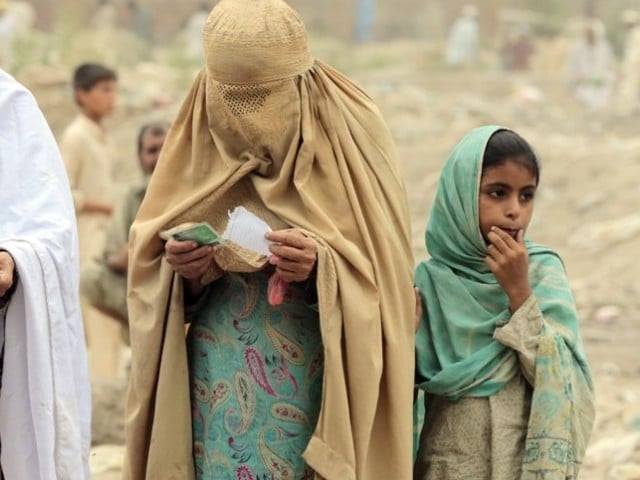Stifled by conventions: FATA, where women’s voices have been silenced
Only sections dealing with women are related to adultery

PHOTO: REUTERS
Women in the Federally Administered Tribal Areas often have to confront unpleasant situations as various sections of the Frontier Crimes Regulations are heavily tilted to favour men.
It is widely believed the honour of women is put above many things in Fata. More often than not, a woman cannot even set foot in a jirga without being represented by a man. Parda rewaj or the use of veil has left many women without a voice. It has deprived them of the ability to stand up for their rights and demand equality in the public sphere.
As a result, many of them feel trapped like prisoners in an obsolete custom and cannot even file for divorce through either a jirga under FCR or a private jirga.
Position of disadvantage
Insiders familiar with the matter told The Express Tribune, jirgas deal with matters related to women under Section 30 of FCR. However, the only subsections that apply to women are related to adultery and even those are heavily tilted to favour men.
Section 30(1) states “a married woman who, knowingly and by her own consent, has sexual intercourse with any man who is not her husband is guilty of the offence of adultery and shall be punished with imprisonment for a term which may extend to five years or with fine or both”.
On the other hand, Section 30(2) states “cognisance shall not be taken of an offence under this section unless a complaint has been made by the husband of the woman, or, in his absence, by a person who had care of the woman on his behalf at the time when the offence was committed”.
In simpler terms, if a woman wants to file an adultery case against her husband, she cannot unless represented by the spouse or a guardian. At the same time, it is on record that not a single case has been dealt with under this section, leaving women at the mercy of a society which has a tendency to dish out much stricter punishments than the law.
No scope for consent
In private jirgas, matters related to women do surface, but are decided without her participation or consent. However, when it comes to ‘honour’ cases, private jirgas steer clear of the matter and there is no nanawatai (sanctuary) in case of honour killings.
Days of yore
In the past, tribal society was based on the concept of collective responsibility and men and women stood shoulder to shoulder when it came to owning movable and immovable property. Women were not only part of a family, but an active member of society. They were part of jirgas and other aspects of socio-economic and political activity.
During weddings and other traditional ceremonies, men and women used to perform the Attan dance together.
In such an environment, men and women had the freedom of choosing their own partners in life. If there was any opposition, the tradition of zagh pa waka would come into play whereby the boy would go in front of the girl’s house and start firing in the air to declare their marriage. The custom had conditions attached, such as the fact that the consent of the girl was necessary for the union.
When it came to adultery, both men and women were punishable by death. In rape cases with women victims, the perpetrators noses were chopped off to serve as a lesson. Meanwhile, there was no jirga or nanawatai in honour cases.
Throes of change
Later, when the British introduced the FCR to the tribal areas, it did not interfere much with traditions, but failed to protect women of the area under the law. After Partition, radicalism seeped its way into the tribal areas and religious clerics started becoming more prominent and even sat in jirgas.
Through the parda rewaj, women were annexed from the mainstream and marriages of boys and girls who had never seen each other started becoming more common. The veil became so common that even the more liberal of tribespeople started following it.
Published in The Express Tribune, April 17th, 2016.













COMMENTS
Comments are moderated and generally will be posted if they are on-topic and not abusive.
For more information, please see our Comments FAQ